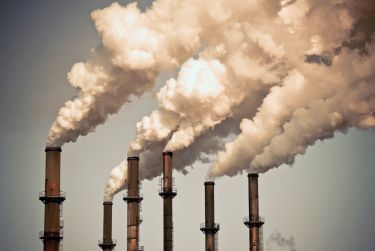
Trade unions are rising to the challenge of tackling the climate emergency
Trade unionists are at the forefront of tackling the climate crisis.
It’s our members in the fire service and across the public sector who have dealt with the devastating impacts of climate change – from floods to fires.
It’s our manufacturing workers who are forging forward with the new technology to deliver more electric vehicles, new forms of power, and lower carbon alternatives to today’s heavy industry.
And we know that all our lives, as well as those of our kids and grandkids, will be devastated if we don’t take urgent action to tackle the climate emergency.
That’s why the TUC passed a motion unanimously at our conference this year calling for a plan to get to net zero emissions.
As the motion set out: ‘ Greta Thunberg and the school students have led the way but educators and the trade union movement as a whole must now act to ensure that they don’t fight alone.’
We know that the best way to confront this crisis is to make sure the plan to get to net zero leaves no-one behind.
So we’ve worked over the last year to develop four principles to make sure we can rise to the challenge of making an economy that works for people and the planet.
Step 1: We need a clear and funded plan for climate action
We won’t get the change we need if we don’t have a plan that starts now. That plan needs to set out how we’ll make sure that the costs and benefits of transitioning to a cleaner, greener economy are shared fairly.
That means setting out how workers will be protected as we move to new forms of low-carbon production.
It means making sure that ordinary workers aren’t asked to pay for the transition through higher energy bills, while government keeps cutting taxes for big business.
And it means making sure that there’s a real long-term industrial strategy to support the industries we’ll need.
Step 2. Workers’ voices must be at the heart of the change
If you want something done right, you need to ask those closest to it.
We know that when business and government consult workers, change is more effective. So we want to see worker involvement at every level of the economy.
We want a new commission on energy use, bringing together workers, business and government.
We want regional structures set up to deliver change across the country to involve workers.
And we need to see just transition agreements at workplace and company level too, to ensure that jobs and rights are protected.
Stronger collective bargaining rights across the economy will be essential to achieve that.
Step 3. Every worker should have access to funding to improve their skills
The transition to a low-carbon economy is one that offers a huge chance to improve Britain’s productivity, and to revive our flagging economy.
But that means investing in the skills workers need to deliver it.
Since 2010, government has cut funding for adult skills by nearly 50 per cent. And employers haven’t stepped in to fill the gap.
That’s why the plan to get to net zero needs to include the right for every worker to train, and the funds to pay for it.
Step 4. New jobs must be good jobs
We know that there will be new jobs in the low-carbon economy, but we have to make sure they’re good jobs.
The transition away from coal and other heavy manufacturing left too many workers facing low pay, and insecure work, and a loss of good quality unionised jobs.
The green industrial revolution should be a chance to turn that around and deliver a new wave of decent work.
But to do that we need guarantees that the infrastructure to tackle the climate crisis will be built here in the UK, and that government funding will come with guarantees that jobs will be on decent terms and conditions, with union recognition and a real voice at work.
Trade unionists are already on the frontline coping with the impact of climate change.
But to bring about change on the scale needed to tackle the causes of the crisis, we must be involved at every step.
Stay Updated
Want to hear about our latest news and blogs?
Sign up now to get it straight to your inbox


